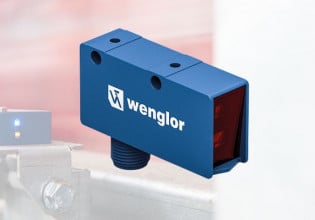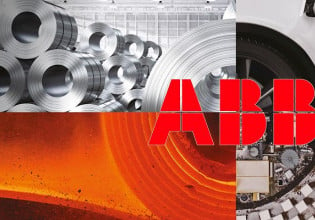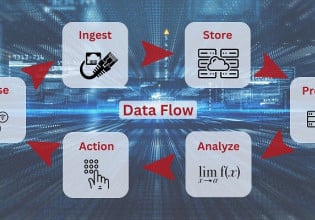ABB’s Smart Factory Software Aims to Advance Steel Melt and Other Harsh Industrial Processes
ABB’s latest smart melt shop software from uses sensors and radar tracking to schedule and control crane and ladle movements in a facility.
ABB is known in many different industries, from high and low voltage control to robotics. Recently, ABB has released a digital software platform for automating the steel melting process.

A diagram showing features of the new software. Image used courtesy of ABB
The software connects the different processes of melting steel for castings into one easy-to-use software. This software also tracks cranes and ladles to optimize the steel-making process.
Typical Steel Casting Process
In a typical unautomated steel melt shop, steel would be heated until a liquid form then transferred to large ladles, which are then moved overhead via cranes and rail cars to the casting location. The molten steel would then be poured from the ladle into the castings.

Engineers working in a metal factory. Image used courtesy of ABB
The melting point of the average steel alloy is around 1370 - 1600 °C, so it is important to always keep the furnace around that temperature. Having to keep a furnace this hot and filled with raw materials requires a lot of fuel and steel. By keeping the furnace filled with molten steel all the time production managers need to have a place to put this molten steel. This creates a scheduling nightmare for some larger factories.
ABB Ability Smart Melt Shop and Thermal Modeling
The smart melt shop software from ABB Ability uses sensors and radar tracking to track and schedule both crane and ladle movements throughout the facility.
By tracking the location of the ladles at all times, the software can collect data on each ladle and predict when maintenance needs to be performed. The ladle data is also displayed in real-time for easier tracking for operators and maintenance staff. ABB has also developed its own algorithms specifically for this software for predictive thermal modeling.
As ladles move around the factory filled with molten steel, they need to reach their destination as quickly as possible because the steel will not stay molten in the ladle for very long. With predictive thermal modeling, the software can forecast thermal loss during the traveling time from the furnace to the caster. Reducing this heat loss over the traveling period could result in better superheat compliance and increase productivity.

The new smart melt shop software from ABB ABility can be used in environments such as the one shown above. Image used courtesy of ABB
ABB states the software has three main benefits: productivity, energy efficiency, and safety. They recorded a four to five percent increase in productivity due to the increased superheat compliance. They also mention that less manual intervention is required because of the historical data on the crane that assists in preventive maintenance.
The company also prioritizes energy efficiency with the new software. The thermal models can result in a five-degree celsius savings per heat and batch. The new software can also increase the forecasting of ladle and crane schedules.
The Smart Melt Shop is already used at the Dolvi Works plant in Maharashtra state. The Smart Melt Shop is expected to increase casting speeds by up to four percent and increase the companies profit by approximately $2million per annum. This equates to a time savings of one workday per month and an additional output of 24,000 tons per year.
ABB is hopeful that this software can help automate some of the dangerous processes associated with steel and metal manufacturing.






